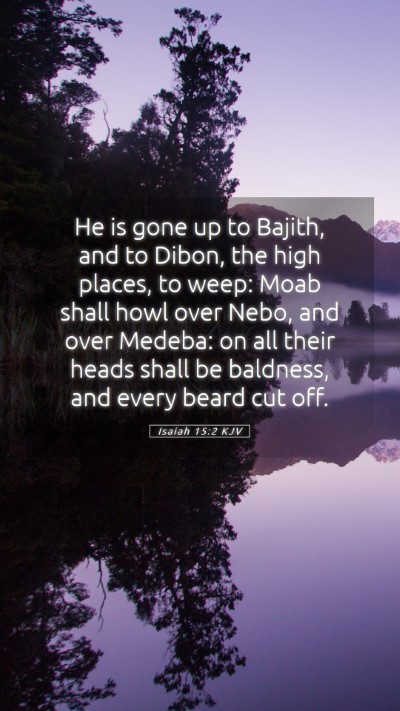Understanding Isaiah 15:2 - A Commentary
Bible Verse: Isaiah 15:2 - "He has gone up to Bajith, and to Dibon, the high places, to weep: Moab shall howl over Nebo, and over Medeba: on all their heads shall be baldness, and every beard cut off."
Overview of the Verse
This verse from the Book of Isaiah reflects the sorrow and mourning among the Moabites due to impending destruction. It serves as a dire prophecy that speaks of God's judgment upon Moab. The reference to weeping and mourning over places such as Bajith and Dibon signifies the lamentation for their lost glory.
Biblical Exegesis and Historical Context
To properly interpret Isaiah 15:2, it's crucial to understand the historical backdrop of Moab. The Moabites were neighboring enemies of Israel and often engaged in conflicts with them. The prophecy delivered here illustrates not just the physical destitution but also a spiritual and cultural collapse. The mention of specific locations like Bajith and Dibon suggests a targeted judgment, indicating that these places were once centers of idolatry and pride for the Moabites.
Insights from Commentaries
Matthew Henry's Commentary
According to Matthew Henry, this verse captures the depth of Moab's devastation. He emphasizes the intensity of their mourning, highlighting that the imagery of baldness and shaven beards denotes a profound state of grief and shame. The external expressions of mourning reflect an internal state of despair due to their impending doom.
Adam Clarke's Commentary
Adam Clarke elaborates on the cultural practices surrounding mourning in ancient Israel and Moab. He notes that the act of shaving the head and cutting the beard was a traditional sign of mourning. Clarke suggests that the mention of Nebo and Medeba, two significant cities, signifies that this mourning is not isolated but widespread throughout Moab. The collective grief emphasizes the severity of the situation and the profound loss they were to experience.
Albert Barnes' Commentary
Albert Barnes adds a layer of interpretation concerning the spiritual implications of this mourning. He points out that this prophecy serves as a reminder of God’s judgment against nations that turn away from Him. Barnes interprets the actions of the Moabites as reflective of their idolatry and rebellion, showcasing the inevitable consequences of such actions. The mention of "howling" further emphasizes the depth of their agony.
Significance of the Verse
Isaiah 15:2 conveys significant lessons regarding the human condition, divine judgment, and the consequences of sin. It serves as a teaching moment for believers, encouraging self-reflection on the importance of fidelity to God. The profound mourning illustrates that turning away from God leads to dire consequences—both individually and communally.
Applying the Scripture Today
In modern application, this verse can prompt individuals and groups in Bible study groups to examine how cultures or lives may be marked by idolatry or sin. It calls for repentance and a return to God, reminding us that excessive pride and self-reliance could lead to downfall. The historical context provides a rich background for understanding the continuing relevance of God's Word.
Bible Cross References
- Jeremiah 48:3-4 - Provides additional context on Moab's lamentation.
- Ezekiel 25:8-11 - Discusses God's judgment against Moab.
- Numbers 21:29 - References the history and conflicts with Moab.
Conclusion
This in-depth commentary on Isaiah 15:2 demonstrates the multifaceted nature of Bible verse meanings and interpretations. It combines insights from significant public domain commentaries to provide a holistic understanding of this potent scripture. Scholars and laypersons alike can benefit from such Bible study tools to grasp the profound implications of God's Word in their lives and communities.


